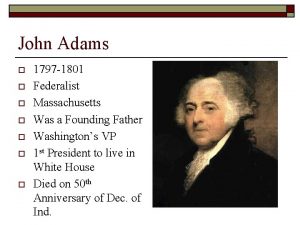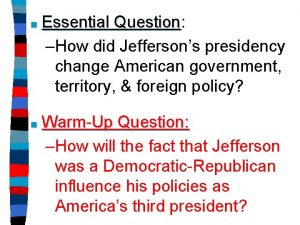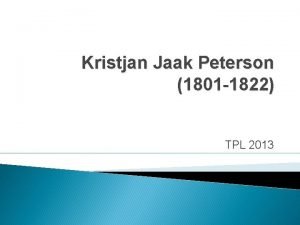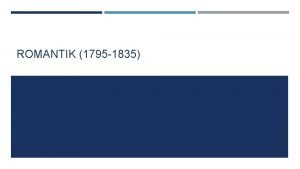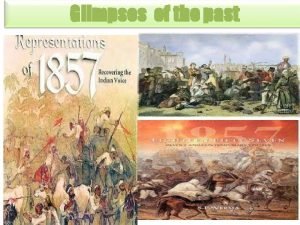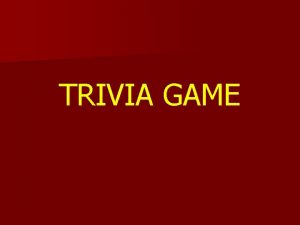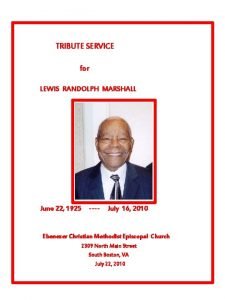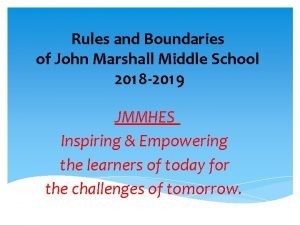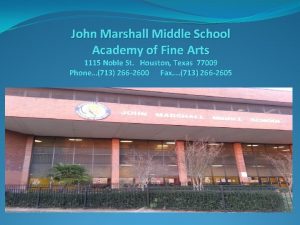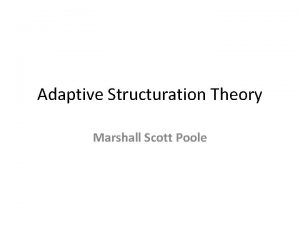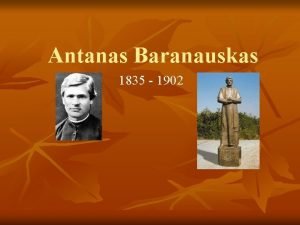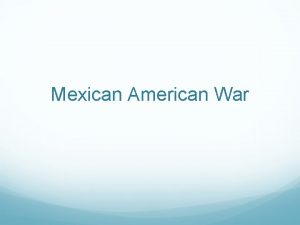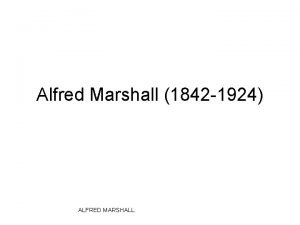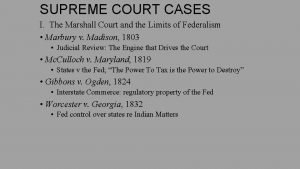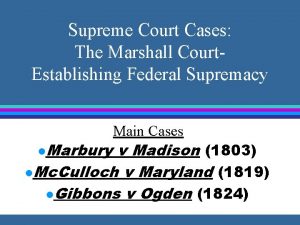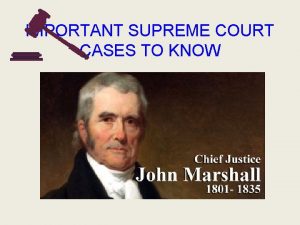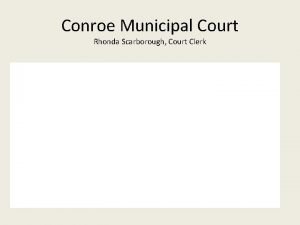Marshall Court 1801 1835 Who was John Marshall












- Slides: 12

Marshall Court 1801 -1835

Who was John Marshall? n n n Born 1755 Family was friendly with George Washington Fought in the American Revolution n n Lawyer Virginia House of Delegates U. S. House of Representatives n n n Captain Spokesman for Federalist party Secretary of State (John Adams) Adams appointed him to the Supreme Court n Packing the courts with Federalists before Jefferson took office (Democratic-Republican)

Chief Justice of the Supreme Court n n Held this position for 34 years First to preside over the Supreme Court in Washington, D. C. Had no building when they came to Washington n Had a room on the first floor of the Capitol n First to wear black robe n Previously scarlet and ermine (like the English) n Marshall changed this – uncomfortable with trapppings of power n

First Job as Chief n Remove the Court from partisan politics and reassert its judicial authority. Not much happening in his early months in office. n Swore Jefferson in as President n Only four judges had shown up in Washington for the session. n

Chemistry on the Court n All justices lived together at the same boardinghouse. n n Marshall’s decision Lived like family n Ate together, talked about their cases

Marshall’s Goals n n n Increase the powers of the national government Diminish the powers of the states Perpetuate the Federalist principle of centralization

Strengthening the National Government n n Expanded the authority of the Supreme Court n Marbury v. Madison – gave the court the power of judicial review n Marshall also asserted the court’s right to overrule a state court, state courts had to submit to federal jurisdiction Expanded the powers of Congress n Mc. Culloch v. Maryland – upheld the constitutionality of the bank – Constitution granted certain implied powers to Congress – in this case the power to create a bank. Also denied a state the right to tax a federal agency. n Gibbons v. Ogden – freed internal transportation from state restraint – gave national government undisputed control over interstate commerce.

Weakened the powers of states n n Fletcher v. Peck – state laws are invalid if they conflict with the Constitution. States can’t arbitrarily interfere with an individual’s property rights. Dartmouth College v. Woodward – states can’t invalidate contracts – charters are contracts.

Conflict with Presidents n Problems with Jefferson when he presided over the trial of former VP Aaron Burr. n n Jefferson publicly condemned Burr before the trial, wanted speedy conviction. Marshall’s interpretation of the Constitution required proof of an overt treasonous act, not just proof of engaging in a conspiracy. Burr was acquitted (decision was very unpopular) Jefferson said, “The Constitution is a mere thing of wax in the hands of the judiciary, which they may twist and shape into any form they please. ”

Marshall’s Legacy n n n Raised the Court to a position of great power in the federal government – made the judicial branch the equal of the other two. Made the Supreme Court the ultimate authority in constitutional matters. Established the primacy of the federal government over states in exercising control of the economy. Opened the way for an increased federal role in promoting economic growth. Affirmed protection for corporations and private institutions from local government interference. Allowed for economic growth.

Summary n n His decisions consistently favored the central government and the rights of property against advocates of state’s rights. Even when Democratic-Republican judges formed a majority on the court, they sided with Marshall because they believed the Constitution had created a Union of states whose government had strong and flexible powers.

Trivia! n n Died in Philadelphia on July 6, 1835. Liberty Bell is supposed to have cracked while being tolled in mourning for him.
 John adams 1797-1801
John adams 1797-1801 John marshall supreme court
John marshall supreme court John marshall supreme court
John marshall supreme court Envidata 1801
Envidata 1801 Kristjan jaak peterson luule
Kristjan jaak peterson luule Romantik historischer hintergrund
Romantik historischer hintergrund Religious leaders preached ideas like —– & ——.
Religious leaders preached ideas like —– & ——. The romanticism (1795 — 1835) what is romanticism
The romanticism (1795 — 1835) what is romanticism Is there a basketball court above the supreme court
Is there a basketball court above the supreme court John marshall randolph
John marshall randolph John marshall dress code
John marshall dress code Marshall middle school houston tx
Marshall middle school houston tx Structuration theory adalah
Structuration theory adalah
